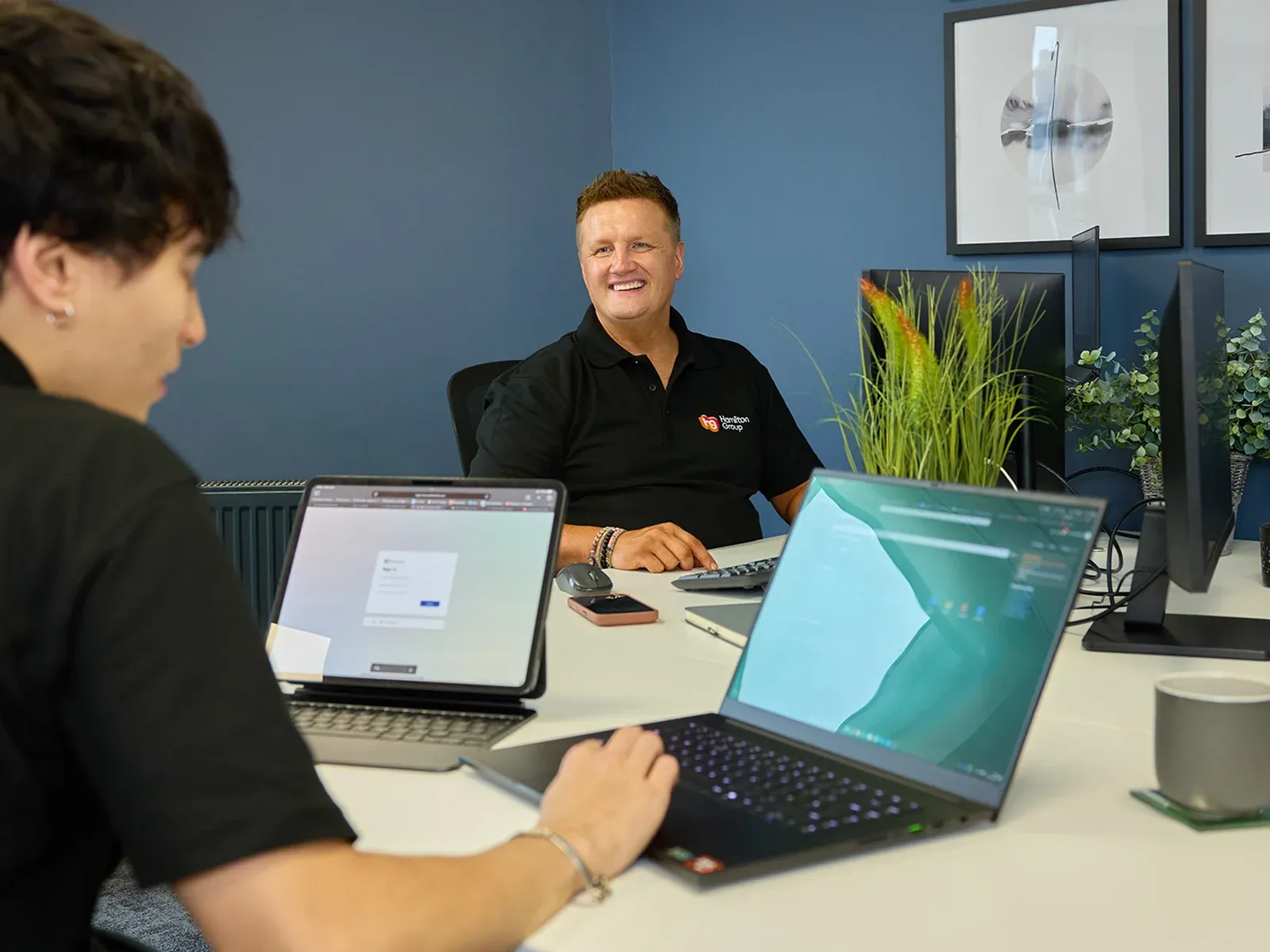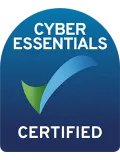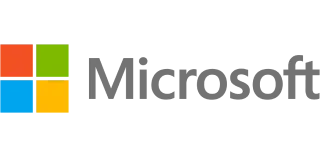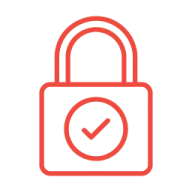
IT That Works. Support That Cares.
Managed IT Support for Yorkshire and Beyond
Practical, helpful IT support and cyber security for businesses who just want things done properly. We fix issues fast, explain things clearly, and keep your business secure.





Work better
Less interruptions, more time getting things done.

Manage threats
Reassurance your systems are protected.

Reduce costs
Know what you're paying for and why.

Scale easily
Add users or tools without disrupting your setup.
Don’t Suffer Bad IT
Tired of IT Slowing You Down?
Do you have emails going AWOL, files scattered across devices, and Wi-Fi dropping mid-call? Or maybe your IT provider promised the earth, but you’ve been left dealing with the chaos when things go wrong.
If you’re losing time to outages, chasing support tickets, or wondering if you’re actually secure, we know how you’re feeling. You want systems that work and people you can actually talk to. If any of this sounds familiar, Hamilton Group is here to help.
- Losing time and money every time something breaks.
- Slow response times, especially when it matters most!
- Vague advice and overly technical explanations.
- Worried your business isn’t secure.
- Feeling unprepared for audits or client questions.
We’re the Ones Who Fix It. Properly.
Hamilton Group is here to restore your faith in IT with reliable, expert IT support, cyber security, and cloud infrastructure.
We fix what’s broken, explain things clearly, and help you stay safe, productive, and in control of your IT. We don’t cut corners or disappear after onboarding, and we promise not to confuse you with too much tech-speak.
IT Support & Cyber Security Services
Services to Move You Forward, Not Hold You Back
Based in Harrogate, but supporting organisations nationwide, our Yorkshire IT services include:

IT Support & Managed Services
From device and email set-up to proactive monitoring and helpdesk, we make sure your systems work smoothly and your team always has someone to call.

Cyber Security
We keep your business secure with managed detection, risk assessments, compliance support and training from a Cyber Essentials Certified Partner.

Cloud & Infrastructure
From Microsoft 365 to cloud migrations and connectivity, we help you modernise your setup and improve how your team works and shares information.

Strategic IT Consultancy & Compliance
We align your IT to your business goals, from audits and licensing to vendor management and digital transformation advice.
Accreditations and Partnerships That Guarantee World-Class Service:
Get That Peace of Mind Feeling

Fewer IT headaches

Systems that just work

Security & compliance sorted

Happier employees

More time for work

Value for money
Solving Your IT Problems
IT Solutions That Get You
We’ve got the experience to get your IT working for you, whether you’re growing fast, heavily regulated, creative at heart, or simply fed up with poor IT. Hamilton Group is perfect for:
|
Who We Help
|
Do You Say?
|
How We Help
|
|---|---|---|
|
Small business with no IT department |
“IT always lands on me.” |
Your outsourced IT department, done properly. |
|
Regulated or compliance focussed |
“We can’t afford a data breach or failed audit.” |
Compliance-ready support with security at its core. |
|
Creative and Apple-based teams |
“Most IT companies don’t get Macs.” |
Mac-native IT support that keeps your team creating. |
|
Businesses getting a poor IT service |
“We’re tired of being let down.” |
Stress-free switch to transparent, reliable IT support. |
Clients Who Trust Hamilton Group for IT and Cyber Security
IT Support You Can Trust

End-users supported

Help tickets completed

Issues fixed in under 15 mins

Microsoft Office migrations
Making The Change Is Easy
3 Steps to Better IT
It’s easy to switch, review, or get extra support, without disrupting your day-to-day operations.

Book a Call
Tell us what’s going on. We’ll listen, ask the right questions, and get to know how your business works.

Get a Clear Plan
We’ll review your setup, flag any risks or gaps, and suggest the right level of support.

Smooth Onboarding
We make it easy and painless to switch provider or onboard for the first time.
Take the First Step
Book a Quick 15 Min Call
The easiest way to find out if we’re a good fit for your business is to have a quick chat about it. Schedule a 15-minute call and we can take it from there.
Sectors We Work With
We understand the systems, software, and compliance needs across a wide range of sectors and tailor our IT support to fit how your business works.
Professional Services
Built Environment
Third Sector & Education
Creative & Digital
Specialist & SME
Hear From Our Happy Clients
"Very supportive company, Hamilton takes away the stress of having to deal with IT issues in my business. Always on the end of the phone when I need them, and they resolve my problems quickly."
"I recently received some online support regarding Outlook and some email issues. I had been trying for months to find a solution. Carl was very knowledgeable and solved my issues. The pricing is very fair, and I would highly recommend this company!"
"Extremely helpful and proficient technical support. Provided one-off troubleshooting when I required support to recover Outlook. Carl was knowledgeable, polite and patient in resolving my issue. Highly recommended."
"I worked with Carl for 4 years, helping me with my computer and IT systems when I was working remotely. He was adept at helping with both Microsoft and Mac computers."
"The team are always helpful and professional. They take the time to explain and go the extra mile."
"Carl was very helpful throughout & the migration went very well. He was on hand to sort out any teething issues, taking calls early morning and into the night. Would recommend for knowledge, attention to detail and great customer service."
The Hamilton Group Approach
We Do IT Differently
We solve the real problems, talk like humans, and leave you feeling secure and supported.
Serious levels of IT expertise
From our founder to our technicians and trusted partners, you’ve got some of the best minds in the business working for you. Some are even ex-Nasa!
Fixing the root cause
Our mantra is to solve the problem, not just close down tickets. So we sort your issues properly and you won’t be calling us every two minutes because the same problem is back again.
Friendly team that cares
Calling IT support can be scary, but not with us. We might be IT geeks, but we like talking to people! And because we love fixing things, we genuinely care about doing a good job.
The very best tools
We use world-class systems and tools to ensure you get the full benefit of the technology you invest in.
Need IT Support That Just Gets It Sorted?
Talk to a real human who can fix it properly and help you work better.
Better IT Starts Here
We’re Always Happy to Chat
No pressure, just a friendly team ready to help you get more from your IT.
Use the form to get in touch and we’ll respond quickly, or contact us directly.











